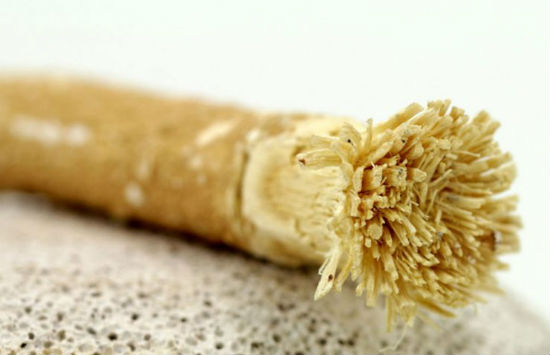
The use of miswak dates back to 7000 years ago! It was first discovered and used by the Babylonians. Since then it has been used by people in the Greek, Roman, Ancient Egyptian and Muslim Empires.
Nowadays, the practice of using miswak has become somewhat obsolete. The credit of course goes to the invention of toothpaste and toothbrush.
However even today it is still used in countries throughout Africa and Asia (especially in the Islamic countries). This is because of its significance in the aspects of oral hygiene and religious beliefs. Being a sunnah of our beloved prophet (P.B.U.H), this natural toothbrush is important for Muslims.

So, what is Miswak?
Basically a miswak is a twig that is used for cleaning teeth. It is made from the roots of the Arak tree, which is also known as the “toothbrush tree”. It can be considered as a traditional and natural form of the modern toothbrush. You don’t need any toothpaste to use this toothbrush.
Benefits of Using a Miswak
Many people consider a miswak more practical as compared to the modern toothbrush. Here are some benefits of using a miswak:
• Miswak is 100% biodegradable. It doesn’t contribute to waste. Toothbrushes on the other hand aren’t as environmentally friendly. Every year 4.7 billion plastic toothbrushes end up in landfills
• It contains chemical compounds alkaloids, salvadorine and trimethylamine that have an antibacterial effect
• Miswak also whitens the teeth, fights germs and removes bad odor
• In 2008, the World Health Organization recommended miswak as a healthy substitute to toothbrushes
• The formation of plaque and tartar (yellow coloration) on the teeth is one of the biggest oral health issues. Due to its anti-bacterial properties, this natural toothbrsh fights against this problem
• Saliva prevents tooth decay by preventing the buildup of acid in the mouth. Miswaks are known to increase the formation of saliva, hence reducing the chances of tooth decay naturally
• The sodium chloride, sodium bicarbonate and calcium oxide present in miswaks strengthens the teeth enamel
• The antioxidants present in miswaks are also said to help fight cancer. Other than that, miswaks are also known for their therapeutic properties and help ease gum pain and inflammation
• Another very big advantage of miswaks is that they are considerably cheaper than other oral products like mouthwashes and toothpastes. They also don’t require rinsing so they can be used on the go
• For Muslims, using this natural toothbrush is a part of following the Holy Prophet’s (PBUH) sunnah and has its religious rewards
How to use a Miswak
The miswak you get from the store looks just like a stick. Many people find it difficult to use. Don’t worry though; follow the following steps to prepare your miswak and you’re good to go:
• Chew off or trim the bark (outer covering) of the miswak from one of the ends, about 1cm off the top
• Now continue to chew on its tip until it softens up and individual bristles are formed. You may dip it in water to ease the process
• Now use these soft bristles to brush your teeth like you would with a toothbrush, only without the toothpaste
• When the bristles dry off, cut the top off and repeat the process again to start anew!

